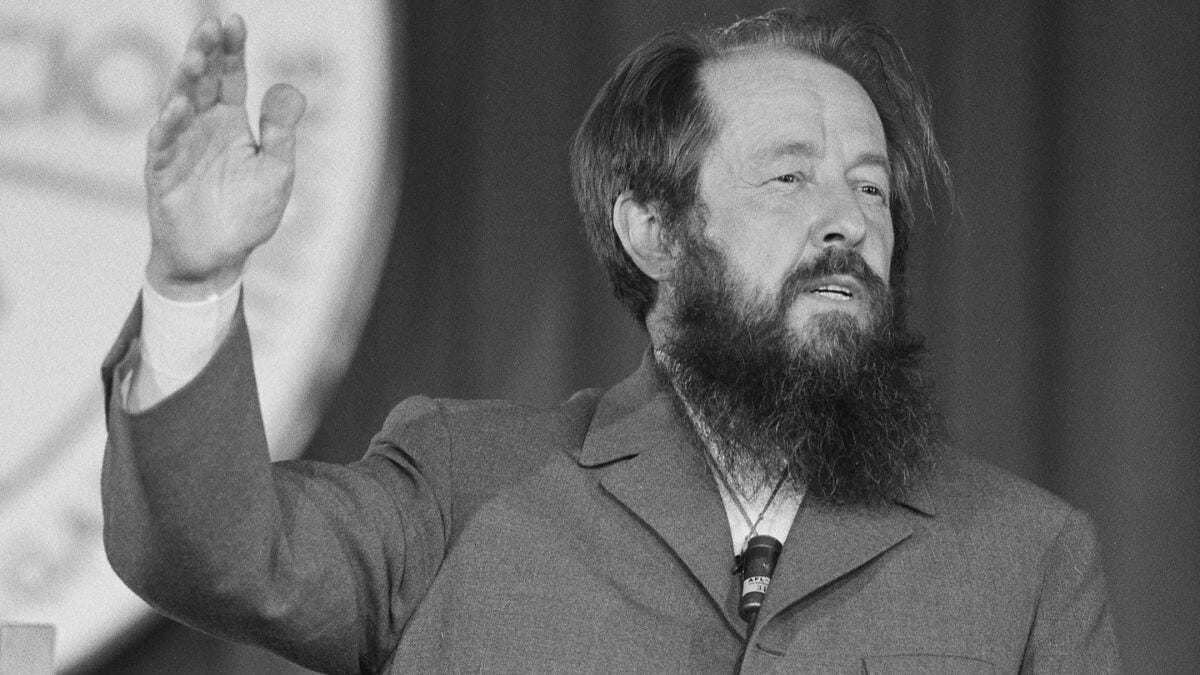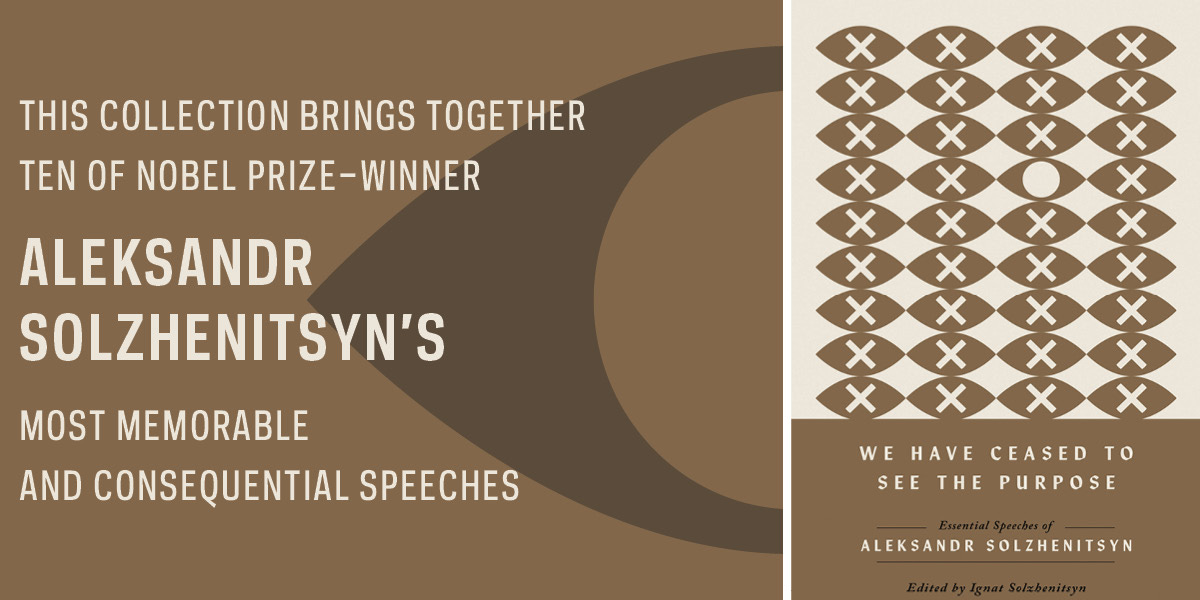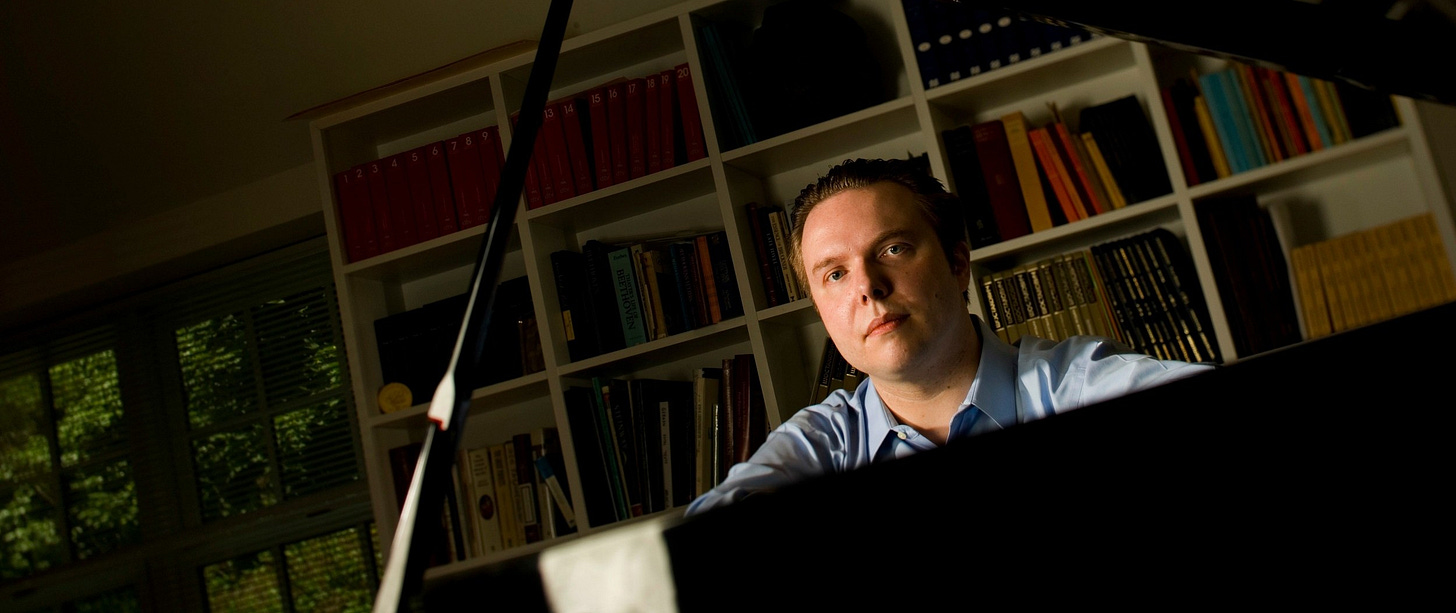Last week, I had the opportunity to interview Ignat Solzhenitsyn, the son of Aleksandr Solzhenitsyn, for the New Books Network.
Solzhenitsyn was one of the twentieth century’s great writers. In 1962, he published One Day in the Life of Ivan Denisovich, a fictionalized account of what he saw as a prisoner in Stalin’s gulag. Other novels followed and he was awarded the Nobel Prize for Literature in 1970. In 1973, he published the first volume of what many consider his masterpiece, The Gulag Archipelago, a history and exposure of the Soviet prison network. A year later, he was arrested, stripped of his Russian citizenship, and exiled to West Germany, Switzerland, and eventually the United States, where he lived, mostly in Vermont, until returning to Russia in 1994. He died in 2008 at the age of 89.
I read the abridged (and author-approved) version of Archipelago in 2022 and have thought about it, off and on, ever since. Although not a novel, it often reads like one as the reader follows the course of a zek through the gulag and learns of the inmates’ deprivations, sufferings, and attempts to conserve hope and humanity. Like The Narrative of the Life of Frederick Douglass, the book is an antidote to complaining. I next read One Day in the Life of Ivan Denisovich, which asks its reader to consider how he would react if he were he placed in the same situation as its title character. Would he be like Alyoshka, who views his imprisonment as an opportunity for spiritual growth? Fetyukov, an outcast? Or Tyurin, working as best he can to please his captors and fellow inmates, resigning himself to his fate and trying to make the best of it?
Solzhenitsyn suggests that your reaction would be a choice of which you would be forced to accept (or, more likely, endure) the effects. “So much of the purport of his fiction,” Ignat Solzhenitsyn told me, “has to do with the choices we make in our lives—and the choices his characters make and inevitably the choices that you and I may make or can make or should make.”
Ignat Solzhenitsyn is a world-renown conductor and pianist. But he’s also an insightful editor and translator who has assembled the first collection of his father’s speeches, We Have Ceased to See the Purpose: Essential Speeches of Aleksandr Solzhenitsyn (University of Notre Dame Press).
To prepare for the interview, I did what I always do: read the book cover to cover, wrote in the margins, and prepared an outline. The best interviews, of course, take detours and I always try to make the interviews like real conversations, but authors like to have a rough idea of the structure. Ignat Solzhenitsyn was the first person, however, who asked me to not send the questions beforehand, emailing that he “would prefer to respond spontaneously.” That was fine by me—preferable, actually—but I still did the prep work for myself so that I’d be able to keep up with him.
I am glad that I did. His spontaneous replies were thoughtful and reminiscent of the deep thinking found in the collection. “As someone who is engaged with his legacy in a close way,” he told me, “I continually marvel at people saying, ‘I feel so close to your father … Your father made such a difference in my life’ … and that is instructive and quite humbling. And I suppose maybe it is no different from any other great writer, but something seems particularly special here.”
What strikes me as so special is the way in which Solzhenitsyn so clearly articulates our problems and potential. Throughout the collection, Solzhenitsyn seems more like a prophet than an artist; there are statements in these speeches that could have been delivered this morning. For example:
“A primeval rejection of all compromise is given the status of theoretical principle and regarded as the high virtue that accompanies doctrinal purity.”
“The West has finally achieved the rights of man, even to excess—but man’s sense of accountability to God and Society has grown utterly faint.”
“Socialism defies logic because it is an emotional impulse, an Earthbound religion, and no one feels the slightest compunction to study or even just to read through the teachings of its preceding Prophets.”
I asked Ignat about his choice of making “We Have Ceased to See the Purpose,” delivered by his father in 1993 to the International Academy of Philosophy in Liechtenstein, the signature speech of the collection. “It does encapsulate, beautifully,” he replied, “one of his great themes. Not just of that address in Liechtenstein, but of all the speeches in the volume and of his writing in general, which is, what is the purpose of our life here on earth?” Solzhenitsyn saw that purpose as grounded in a belief in God and a questioning of the Enlightenment assumption (traced back to Protagoras) that man is the measure of all things. “If we are at the center,” Ignat said, “and there is no God and there is no moral law, there is no natural law—if it’s simply ‘What benefits me is good,’ well, then what?” Solzhenitsyn wants us to consider where that kind of thinking leads and what kind of harm this kind of thinking has already caused.
Again, the effects of our choices on personal and national levels came up in the interview several times. Solzhenitsyn speaks of how “progress” is spoken of as an absolute, unquestionable good, without our asking what it is to which we are progressing. (I do not know if Solzhenitsyn ever read Thoreau, but they strike me as kindred spirits.) “Progress has proceed magnificently,” Solzhenitsyn says, “but has led to consequences that preceding generations could never have attained.” When I asked Ignat about this, he spoke about technology:
Technological progress: Do any of these things do anything for our soul? Do they make human beings better? Do they make us kinder toward each other? Perhaps they don’t. And then the unforeseen consequences are, conversely—even if many smart thinkers have pointed out, ‘Technology is neutral—it’s what we do with it,’ OK, that’s hard to disagree with, that seems very logical. But what does the evidence show? Are we using it to the good? Are we using to to ennoble or enrich our souls or the souls of our fellow human beings or are we doing the opposite? I’m fascinated, and, I think, emboldened … to see to what extent the tide seems to be turning against social media—not to say that it’s going to disappear, but it seems now widely acknowledged on all sides of the political spectrum, for example, that it can cause great angst and depression even from teenagers in particular, who of course are the prime—the first evangelists of it. But what is it doing to them? And just the fact that these questions are now being openly debated, at least, as opposed to saying, ‘Oh that’s such a Luddite thing to say! How could you ever question that any technological advance might be destructive? Or might at least have the power in it to benefit and to destroy?’ The fact that this is no longer taboo is a welcome development and I think it’s something that Solzhenitsyn would have taken some hope from.
The conversation was as far-ranging as the speeches in the collection: we also spoke about the role of the artist, how Ignat learned more about his father’s story as part of the natural experience of family life, and the courage his father demonstrated in delivering some of these speeches, although always, as Solzhenitsyn hoped, in the spirit of a friend delivering a hard but needed truth to another.
A reader need not know much about the Cold War, communism, or Solzhenitsyn’s books to appreciate this collection. It’s both a wonderful introduction and reminder of Solzhenitsyn’s value as an artist, gadfly, and thinker. The speeches are accessible to anyone interested in asking big questions. “His is a very broad and generous call to—not even to conscience,” Ignat said, “but a call to consciousness—to be worthy of the human consciousness that we have.”
To close the interview, I asked Ignat about his father’s 1978 commencement address at Harvard. Talking about the barrage of news, gossip, and noise that comes at us all day, made worse almost fifty years later, Solzhenitsyn says, “A person who labors diligently and leads a meaningful life has no need at all for this excessive and burdening flow of information.” I asked Ignat, “What, according to your father, is a meaningful life?”
To hear his answer, listen to the interview here on the New Books Network, below on the player, or wherever you find podcasts.






Thank you. You've inspired me to revisit Solzhenitsyn.
I have always been intimidated by this artist and his work(the depressing subject matter? I thought he was a bit of a crank by going back to Russia? I'm not sure.) I will listen to the interview and try to read up on this great man's work. Thank you Daniel for bringing such intriguing subject matter to us.